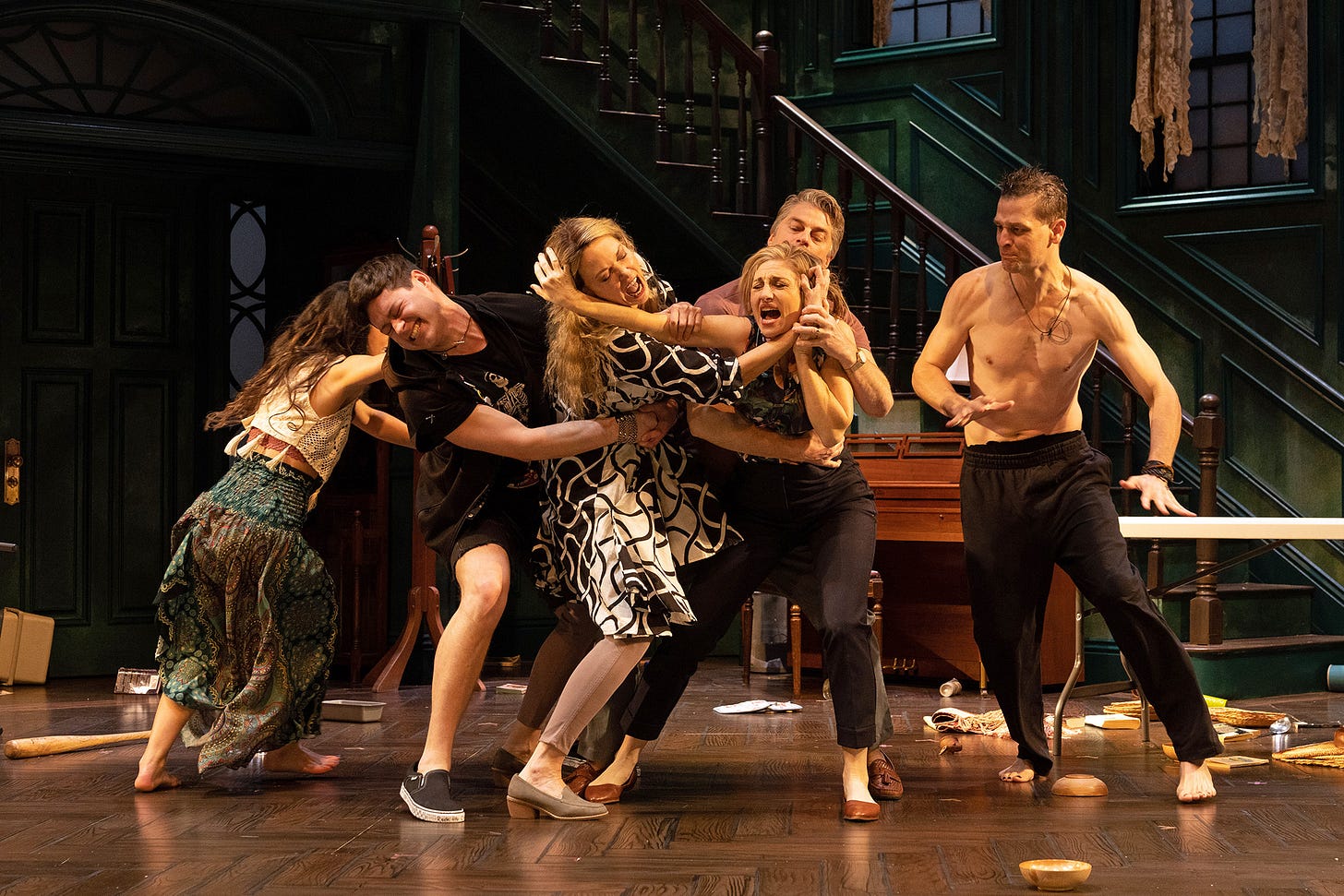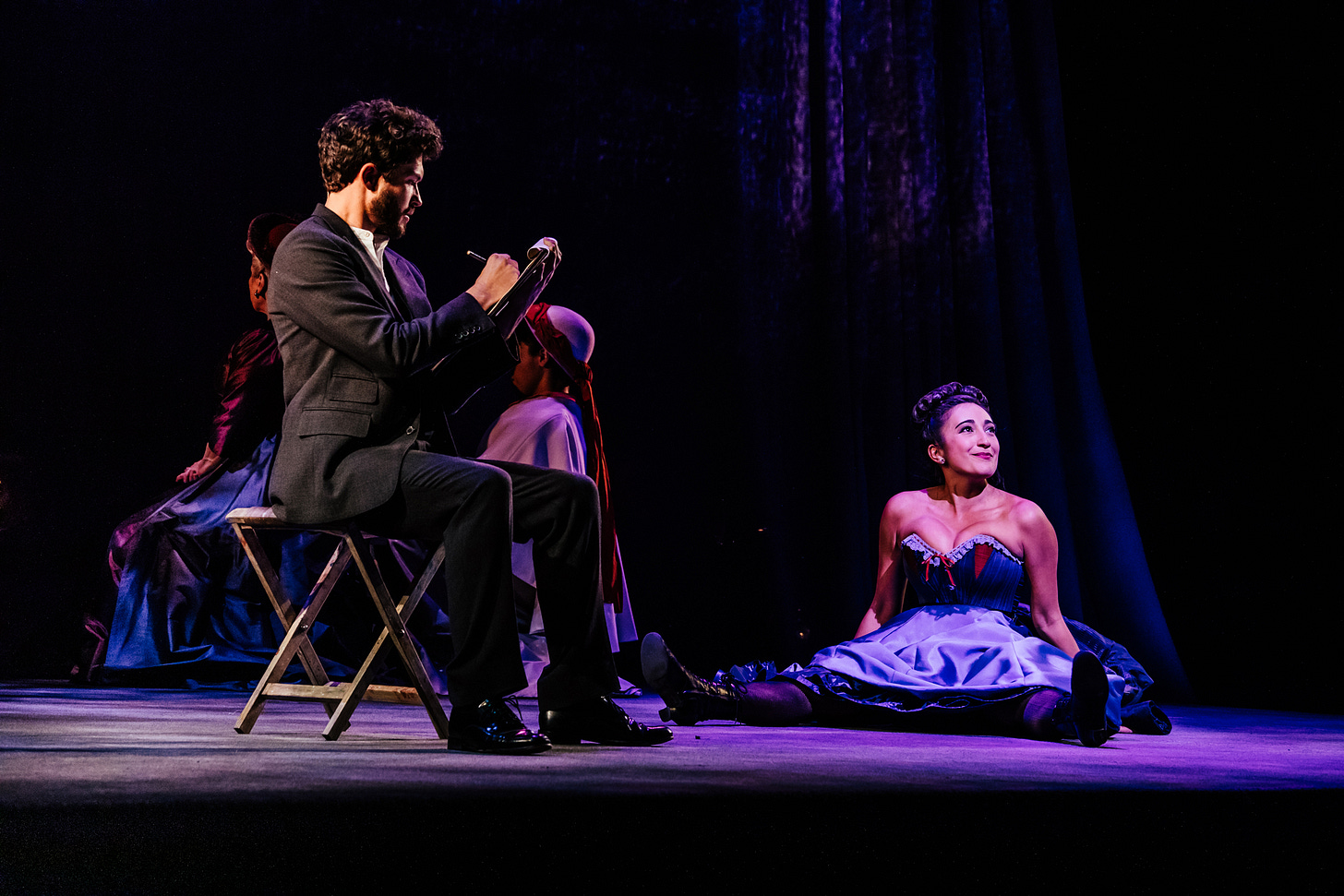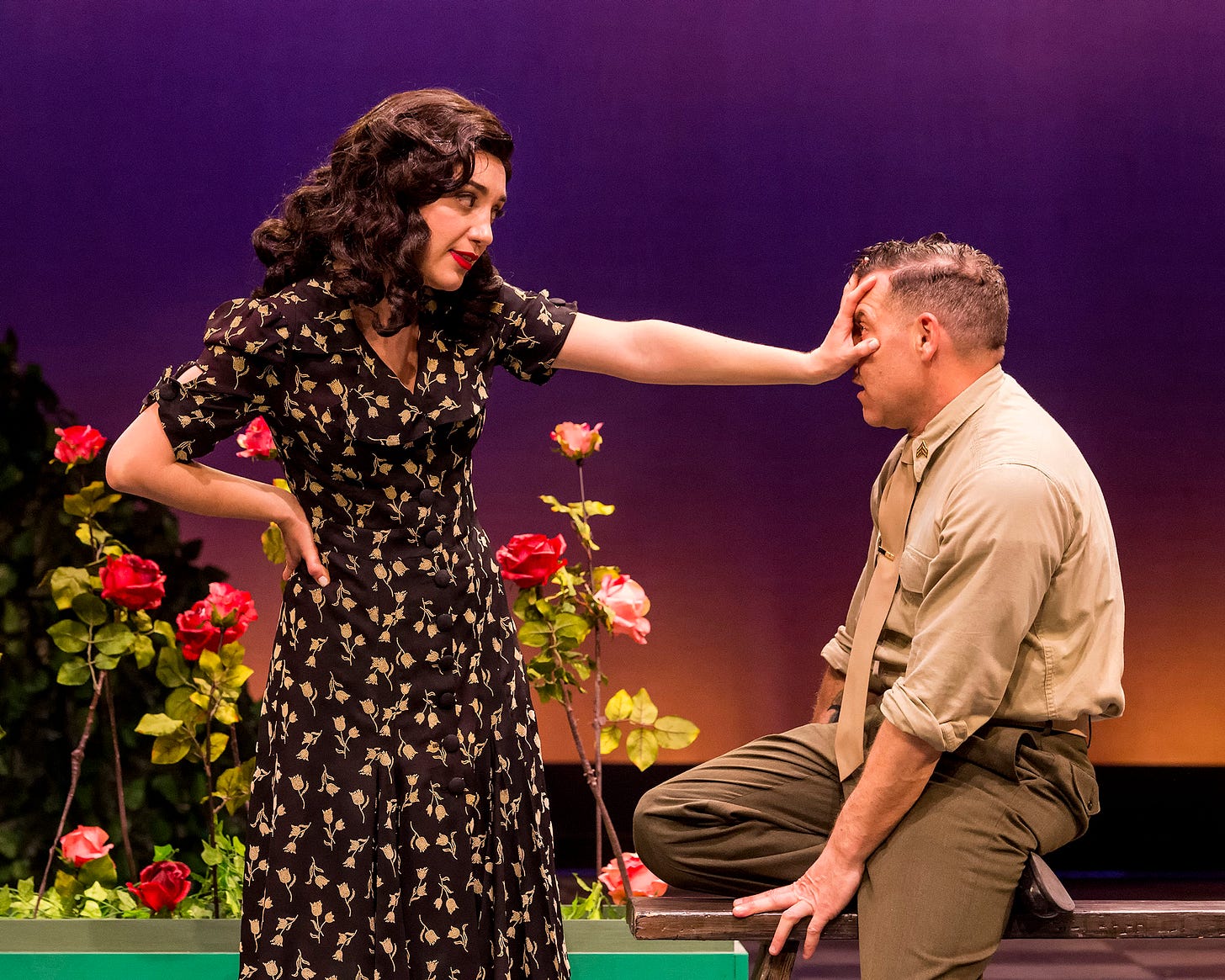The 'R' in SCR. A WW2 'Much Ado'. 'Sunday' starts Sondheim fest. The 'Maggie' musical.
Plus Geffen's 'Breath,' Kristina Wong, and more.
A flood of openings gushed through Greater LA theaters in February — although two of the new productions were delayed by an outbreak of COVID.

During the first weekend of the month, South Coast Repertory in Costa Mesa planned to activate the “repertory” in its name for the first time in the company’s 59-year history — with two different plays sharing the same stage and many of the same actors in alternating performances. “The Little Foxes” and “Appropriate” were waiting in the wings, united not only by a stage and actors and narrative similarities but also by a composite title — “Voices of America.”
Unfortunately, COVID barged in, canceling the entire opening weekend of both plays.
As personnel began to recover, performances subsequently began with the help of four understudies. The casts were intact by the time I saw the two productions, two weeks after the originally scheduled openings (although a pre-COVID change in the casting of the smallest role in “The Little Foxes” had also occurred).
The VOA plays will close Sunday, as originally scheduled. I had hoped that they might be able to extend for at least another week.
They fit together well. They’re both set in large Southern living rooms, but more than a century apart — “Foxes” in 1900 (its premiere occurred in 1939), and “Appropriate” in the early 21st century (it first opened in 2014).
Three adult siblings — two brothers and one sister — are the characters at the heart of each play, and the sister emerges as the strongest and most pivotal character in each script. The magnificent Shannon Cochran portrays both roles — Regina in “Foxes,” Toni in “Appropriate”. Note that “Foxes” was written by Lillian Hellman, in an era when strong women weren’t all that common on stages.
Both of the fictional families are white, but their ancestral heritage was built on the backs of slaves. This is more obvious in “Appropriate.” Note the subtle wordplay in the double meaning of the title (it’s a verb as well as an adjective), the discoveries of racist artifacts in the old house, and the fact that the play was written by Branden Jacobs-Jenkins, who is Black.
That sharper awareness of the brutal past in “Appropriate” — as well as the fact that it’s divided into two parts, with only one intermission — transform “Appropriate” into a much more powerful production than “Foxes.” Hellman’s three-act structure, with two intermissions interrupting the momentum, now feels old-fashioned. We’re often told that attention spans have diminished, but perhaps the theater is an exception to that rule.
I used “transform” in my description of this “Appropriate” because my only previous experience of the play, in its West Coast premiere at the Mark Taper Forum in 2015, didn’t impress me nearly as much as Delicia Turner Sonnenberg’s staging at SCR.
However, “Foxes” director Lisa Peterson had a more difficult challenge — to find something new to say in Hellman’s play, which I’ve seen repeatedly over the decades. Elizabeth Taylor (!) played Regina at the Ahmanson in 1981. In 1998, A Noise Within staged its own repertory festival of “Foxes” and Hellman’s “Foxes” prequel “Another Part of the Forest.”
A ‘Much Ado’ from World War II
Speaking of A Noise Within, its new take on Shakespeare’s “Much Ado About Nothing” (in Pasadena, as opposed to Glendale, where the company was based when it staged the Hellman rep) is a sizzling theatrical soufflé.
Director Guillermo Cienfuegos keeps the action almost constantly in motion by using the cast members as artfully-choreographed stage hands, swiftly moving small set pieces around the thrust stage instead of relying on more permanent scenic components.
He also raises spirits by updating the Sicily setting to 1943, as Allied soldiers were liberating the island from the fascists. Among those smaller set pieces is a miniature Jeep. The cast’s animated activity sometimes merges with the invigorating dance steps of the ‘40s era. As Don Pedro, Frederick Stuart plays a charming British-born film star, AKA “The Prince,” who helps maintain the morale of the troops.
Beatrice and Benedick remain the heart of the action, still gradually realizing that their supposed mutual loathing is actually mutual liking. I can’t remember a more charismatic couple in these roles than this production’s Erika Soto and Joshua Bitton. And Rafael Goldstein has a field day playing two roles — the glowering villain John and an incomprehensible old coot, Verges.
There is much ado in this “Much Ado,” but additional ado is stirring four miles west, in the Pasadena Playhouse revival of “Sunday in the Park With George.” It launches the professional part of the playhouse’s six-month festival of the work of the late, great Stephen Sondheim.
‘Sunday’ in Pasadena with Sondheim

The first act of “Sunday” initiates this salute to the unconventional genius of Sondheim with a depiction of an earlier but also unorthodox artist, the French pointillist Georges Seurat, and his devotion to his vision at the expense of his lover/model Dot. Fortunately for us, most of the potential comparisons end there — the real Seurat died at the age of 31, in contrast to Sondheim’s death in 2021 at the age of 91, after decades of additional masterpieces and a very-late-in-life marriage.
The much shorter second act of “Sunday” flies farther into fiction, depicting Seurat’s supposed great-grandson as an American artist in the 1980s, trying to piece together “chromolume” installations but spending much of his time working with grants and arts politics instead of the art itself — until he realizes that he must “move on.”
Both Seurats here are played by Graham Phillips, whose voice often reminded me of the original cast’s Mandy Patinkin. Krystina Alabado is ideal as Dot in the first act and George’s grandmother Marie in the second.
Director Sarna Lapine, who is the niece of the brilliant “Sunday” book writer James Lapine, probably had less room on the Pasadena stage than she had on Broadway when she staged a 2017 revival starring Jake Gyllenhaal — especially in the show’s panoramic scenes involving the image of Seurat’s “A Sunday Afternoon on the Island of La Grande Jatte.” But the music and the imagery still combine to create a remarkably moving first-act climax — which is then immediately contradicted by the more cynical comedy that starts the second act.
My appreciation of the funnier beginning of Act 2 was somewhat limited because a couple of apparently late-arriving theatergoers spent at least three or four minutes squeezing their way back and forth in front of me and others in my row, loudly trying to ascertain where their seats were. Finally I heard the man telling the woman that apparently they were holding tickets for the wrong date. I have no idea who was responsible for this mix-up, but I’m still wondering how it reached this point. Were there no ushers who would have examined the tickets before the couple started entering our row — after the second act was already beginning?
But let’s move on…to ‘Maggie’
So far I’ve been writing only about revivals, but a zippy and brand-new musical, “Come Get Maggie,” also deserves attention, in Rogue Machine’s premiere at the intimate Matrix Theatre on Melrose. It’s a satirical glance at two cultural phenomena of the 1950s: the stifling of women’s talents and ambitions, and the sci-fi movies of that era that sometimes explored other worlds outside our own.
Diane Frolov’s book and Susan Justin’s music (with lyrics by the two of them) move briskly between two worlds under the direction of Michael Pressman. Melanie Neilan, in the title role, is entrancing as a brilliant physicist, then an unhappy housewife, then a murder suspect, then a space traveler.
It’s an amusingly loopy plot, but fortunately it ends back on earth, although I won’t give away the details. And “Come Get Maggie” has as many juicy supporting roles for men as for women, with exemplary performances in all of them. In such a small space, the musical dimensions are also small, but just about every clever lyric is relatively easy to hear. Rogue Machine’s first musical offers hope that the company might explore others.
A somewhat more sobering dramatic account of a woman finding her way — but only in this world — is Berlin-based Serbian playwright Iva Brdar’s “And If I Don’t Behave, Then What,” soon to conclude its West Coast premiere, at Open Fist Theatre in Atwater. It’s an insightful depiction of a woman’s lifespan as told in brief segments, augmented by a chorus of adept actors playing many of the people in her life. Director Beth Milles skillfully navigates this unconventional biography. In the central role, Cynthia Ettinger reads from a hand-held script — a directorial choice reflecting how this woman was trying to live according to the lines and cues that were mostly provided by her mother, sometimes stumbling as she goes. It’s an effective device, enhancing the play’s quietly performative theatricality.
Two teen tuners
Two musicals focusing on high schoolers are making their first full-scale appearances in our area, in the wake of the much better teen musical “Mean Girls” last month.
Barry Wyner’s “Calvin Berger,” first produced in Massachusetts in 2006, is now in a Colony Theatre production in Burbank, directed by Richard Israel. It’s a fairly faithful update of the “Cyrano de Bergerac” story — and therefore can hardly escape the adjective “formulaic.” The title character is a teenager, obsessed with the idea that his hardly unusual nose prevents him from impressing the girl of his dreams. But he’s willing to write notes (on paper!) that might help a better-looking but less articulate classmate get the same girl — while Calvin barely notices that his reliable gal-pal wants to be more than his best friend. The score is fairly bland, especially for those of us who recently saw and heard not only “Mean Girls” but also, duh, “Sunday in the Park.”
At least the “Calvin Berger” book has a coherence lacking in “Ride the Cyclone,” a Jacob Richmond/Brooke Maxwell musical fantasy that initially appeared in 2008 but is now in its California premiere at Chance Theater in Anaheim. The premise here is that teenagers who were killed in a roller-coaster accident are now competing, in the afterlife, for a chance to return to earth. Each of them gets a big production number to state his or her case, while a mechanical fortune teller serves as referee. The formula here struck me as a twisted version of “A Chorus Line,” but its fantasy ingredients feel contrived in order to erase any connections to real life — or death.
Family ties
I’m already regretting suggesting that theater might be an exception to our diminished attention spans (see the SCR section, above). It’s because of my impatience as I beheld the four-hour “The First Deep Breath” (including two intermissions), a family soap opera at the Geffen Playhouse.
Indeed, when I read in the bio of playwright Lee Edward Colston II that he has written for “Fargo” and is developing a new series with Warren Littlefield, I wondered why “Breath” itself was written for stages instead of streaming (or if it’s actually doubling as a workshop for a TV project). A series would enable us to take, well, deep breaths between episodes. Those episodes could feature no more than one major crisis at a time, as opposed to the colliding crises on stage. If you’re in the mood for more focused family conflict this weekend, “Appropriate” at SCR is a much better bet.
Family dynamics also get in the way of John Guerra’s “The Dry Years,” a Ghost Road production at the Broadwater in Hollywood, which initially sounded as if it might be a production that LA needs in 2023. It’s not. Set somewhere, sometime, in California’s rural central valley, its muddled narrative dwells on familial passions at the expense of bigger issues. The characters include a “rainmaker” named Hatfield, which was also the surname of the real-life “moisture accelerator” who already inspired (under the fictional name of Starbuck) the 1954 play “The Rainmaker.” The actual Hatfield began his career in nearby Glendale more than a century ago, but this isn’t mentioned in “The Dry Years”. I’d much rather see either a fact-based drama about this legendary SoCal figure or — even better —a hard-hitting play about our area’s climate-change challenges.
Yet another family play, but one that’s considerably funnier than “The First Deep Breath” or “The Dry Years,” is Katie Forgette’s “Incident at Our Lady of Perpetual Help,” in a Theatre 40 production staged by Ann Hearn Tobolowsky in Beverly Hills. It depicts a Catholic family in the 1970s, but it’s not about priestly sexual abuse, although it’s partly about priestly hypocrisy. It’s also about how these Catholics explain – or don’t explain – sex to their younger daughter, by assigning the task to their older daughter. A lot of breaking of the fourth wall helps connect us to those distant days.
Too late for topicality?
“Kristina Wong, Sweatshop Overlord,” a solo at Kirk Douglas Theatre in Culver City (co-produced by Center Theatre Group and East West Players), begins well. We see Wong cavorting around a colorful playhouse set, as she relates how she started sewing homemade masks and enlisting others to do the same during the first months of COVID. But the script’s lack of conflict soon becomes evident. Wong doesn’t discuss the eventual medical advice that N95 masks are considerably more effective than cloth masks. There is no trace of discontent among her volunteer “sweatshop” workers on any subject. Good deeds don’t necessarily translate into good theater — especially in a solo format, where the performance begins to seem self-flattering.
If Wong’s script has arrived a little too late to be truly topical, the same can be said of Phinneas Kiyomura’s “Nimrod,” a broad satire on the final years of the Trump presidency, at Theatre of NOTE in Hollywood. Its most memorable feature is the performance of Kirsten Vangsness as Trump (here identified as Nimrod), often speaking nonsensical gibberish. Imagine how Trump might look if he were to participate in a drag-queen story hour…




